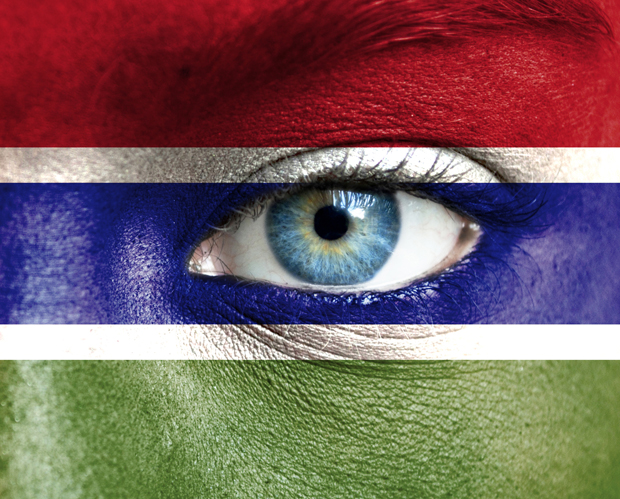Index relies entirely on the support of donors and readers to do its work.
Help us keep amplifying censored voices today.

Gambian President Yahya Jammeh has bowed to EU pressure to implement political reforms — including changing the country’s restrictions on the media.
This comes barely a year after he rejected a proposal from the European Union to introduce reforms, including repealing draconian media laws, establishing a National Human Rights Commission as proposed by the Commonwealth Secretariat, and abolishing the death penalty within 24 months.
In January last year President Jammeh told local media The Point and Observer newspapers that he will not be blackmailed by the European Union with what he described as “chicken change” to accept what is not in the interest of the Gambia people. He said the “Gambia will never be colonised twice”.
The EU delegation held a closed door meeting with Jammeh last Tuesday to discuss the way forward. Dominique Delacour, the Dakar-based European Union ambassador, told a local journalist that: “We discussed also the issue of consular affairs issuing visas to Gambians. So we had a very frank discussion on an array of issues, which was very productive. The Gambian side also presented their main strategy in terms of governance, and human rights and development cooperation,” she said.
Delacour said the delegation was also in Banjul to present to the Gambian leader with the result of the their preliminary discussions in the country, as well as the declaration that came out of the recent EU-Africa summit held in Brussels.
The European Union is the leading aid provider for the Gambia with a total of €65.4 million of grants allocated for for the period 2008 -2013.
But its demands for more political freedom are seen by the Gambian regime as interference in the country’s domestic politics. Article eight refers to the political dimension of the Cotonou Agreement, the legal framework covering political, developmental and trade relations between the EU and African, Caribbean and Pacific countries, of which the Gambia is a signatory.
A group of Gambian rights activist led by the Amadou Scatted, Janneh former Information Minister who was jailed for attempting to stage a non-violent protest against the dictatorship in Gambia has present a set of recommendation to the human rights bodies ahead of the Universal Periodic Review meeting in Switzerland later this year. This is with a view to pressure authorities to carry out comprehensive reform such as the repealing all draconian media laws, and the protection of human right in general.
However, the Gambia National Assembly on Tuesday unanimously adopted two books entitled A Million Reasons to Leave the Commonwealth and How the Tragic Consequences of British Looting and Misrule in The Gambia Inspired the Foundation of the United Nation’s Drive for Decolonisation in January 1943 and Beyond.
According to pro-government newspaper Daily Observer, the books were authored by the president with a view to reaffirm its commitment to end Gambia’s decade-long membership to the Commonwealth, the 53-member organisation headed by the Queen of England.
Parliamentarian Seedy Njie said in a motion in the first session of the legislative that the content of the books were reason enough for the Gambia to leave the commonwealth. Meanwhile, NJie’s statement has confirmed the argument of Mr Halifa Sallah on the content of the book authored by the authoritarian leader.
This article was posted on 14 April 2014 at indexoncensorship.org
Gambia’s president Yahya Jammeh has said he will soon discontinue the use of English as his country’s official language, describing it as “colonial legacy”. The plan appears to be to make a local language the country’s official one, but reports have also emerged suggesting Arabic will replace English.
Speaking at the swearing-in ceremony of the country’s newly appointed Chief Justice, Jammeh — known for his anti-western rhetoric and policies — said for the next “one billion years”, the British have “no moral platform to talk about human rights anywhere in the world”. Gambia gained its independence from the UK 49 year ago, and the president stated that the only British remnant is the English language. “We no longer believe that for you to be a government, you should speak a foreign language; we are going to speak our own language,” he emphasised.
The move comes after Gambia withdrew its membership of the British Commonwealth in October last year, stating that it “will never be a member of any neo-colonial institution and will never be a party to any institution that represents an extension of colonialism”.
The news has been met with opposition. Former diplomat Dr Momodou Lamin Sedat Jobe, now heading the pro-democracy group Gambia Consultative Council (GCC), told news site Jollof that the president’s latest statement is “yet another disappointment”, questioning its feasibility.
“It is much easier said than done,” said Hamat Bah, leader of the oppositional National Reconciliation Party (NRP), in an interview with local newspaper the Point. He said the implications and ramifications would be huge and must be addressed before the change could be made.
Demba Ali Jawo, a journalist and prominent political analyst, suggested that President Jammeh’s announcement was just a diversionary tactic to shift focus from the economic and social problems his government faces. He points out that a change of language would take much more than just mere anti-western rhetoric, arguing that “as our languages are not yet written, we need to develop a dynamic written form which has the capacity to accommodate the rapid technological development, including information technology”. He highlighted the judicial system as a sector where the switch away from English could be particularly complicated, and predicted that it would take much longer than President Jammeh’s own lifetime for Gambia to completely do away with the use of English.
This article was posted on March 28, 2014 at indexoncensorship.org

The increasingly authoritarian regime of Gambia is suspected of blocking the popular social media app Viber following weeks of speculation on the government’s intentions. The government said it has not been banned and blames service providers for the outage.
Threatened by the growing popularity of free internet phone services using voice over internet protocol (VOIP), the government of Gambia is said to believe the use of such services is helping online Gambian media in the diaspora to deliver information to the public through whistle blowers.
The regime in Banjul is also looking into the possibility of extending the block to other calling apps like Skype, according to press reports.
“The government has decided to block Viber. We cannot communicate with our love ones in the diaspora”, an insider at GAMCEL, the national cellular company, confirmed to index. The source said that a new app called Hitalk can be downloaded to get the Viber-like services.
Asked what prompted the decision “it is government order and we as mere employees we have no other option to obey instructions given to us by our bosses,” the source said.
In an interview with the Standard, a local newspaper, Lamin Camara deputy permanent secretary at the ministry of information and technology denied that government blocked the app.
Camara blamed what he described as erratic network of service providers. He said patchy service is affecting the quality of calls that subscribers can make through Viber and other social media services.
Sidi Sanneh, a former Gambian civil servant and a political activist, posted an opinion piece on this blog saying that this is not the first time the regime tried to censor the internet. Sanneh described the Gambian regime as a desperate one.
“We managed to place calls to Banjul using Viber and discovered that there are some who are indeed experienced interruption of service for the past couple of days,” he stated. Sanneh went on to say that there are a few who have already resolved the problem by simply downloading other apps to get around what appears to be a nuisance.
He advised users to download a VPN client, which allows the user to be assigned a random IP address that changes every time Viber is used.
“We were told that the persons engaged by the regime to interfere with the internet are ‘amateurs who will only succeed in damaging their servers’”, Sanneh concluded
Sam Phatey, a Gambian intelligence analyst and American Street News contributor told ASN, an online Gambian newspaper, that the decision of the Gambia government is illogical.
Phatey observed that the government feels insecure and scared because exiled dissenters are using the service to plan and communicate with Gambian.
In April last year the Gambian regime ordered the Public Utility Regulatory Authority to ban the use of phone services using VOIP, the regime also imposed stiff charges on internet cafes to register for use of VoIP.
This article was published on March 26, 2014 at indexoncensorship.org

Driven into exile by the brutal regime of Gambia’s president, Yahya Jammeh, journalist Omar Bah’s dramatic flight from his homeland is recounted in his memoir Africa’s Hell on Earth: The Ordeal of an African Journalist.
An outspoken critic of the country’s autocratic ruler, Bah was forced to flee Gambia for neighbouring Senegal, where he was welcomed by other Gambian exiles who had settled in Dakar. Later, his path led him to Ghana and eventual resettlement in the US.
“I wanted to use my new found freedom in America to speak up because I regained the voice I lost. The book is my source of rejuvenation, my symbol of refusal to be silenced, and the avenue to continue to expose corruption, mismanagement, torture, repression, killings and the general dictatorship in The Gambia. I feel I owe it to the suffering people in The Gambia”, he stated.
Bah fell from grace after he was suspected of the being an informant for US-based Freedom, an online news site critical of the Jammeh regime, while working for the pro-government Daily Observer newspaper.
As a US resident, Bah says he feels challenged to speak about the injustices and give a voice to the voiceless since he now has the ability to speak up against the dictatorship in the Gambia without fear of reprisal.
“The name of this book, Africa’s Hell on Earth, refers to the nickname of the infamous Gambian prisons where so many people have disappeared. The prisons are overcrowded, and there are lots of diseases, torture, executions and suffering. Worse still, majority of the detainees are there simply because they oppose the regime. The Gambian dictator, Yahya Jammeh, has ruled for nineteen years. During this period, he has killed, tortured and exiled many Gambians.”
He said the Gambia is a country where is so much poverty while the powers that be live in luxury without regard to the poor and sick population. The writer bemoaned the situation of the Gambian people, who are subjected to summary executions if they dare oppose the regime.
In a review of Bah’s book Demba Ali Jawo, a former president of the Gambia Press Union, described it as an accurate depiction of the obstacles Gambian journalists have faced since the Jammeh regime came to power. Jawo called the book an invaluable reference for those interested in documenting the atrocities being committed against innocent Gambians by their own government.
According to Jawo, Bah narrowly escaped a dragnet that had been thrown around the Gambian capital, Banjul, to arrest him. A soldier let Bah pass through a checkpoint.
“By letting Omar go, the soldier not only risked his own job and life, but he also had to forego promotion and even compensation if he had handed him over to the authorities”, Jawo observed.
Bah now lives in Rode Island with his wife and two sons is attending graduate school through scholarship. He is the founder of the Center for Refugee Advocacy and Support and represents the state of Rode Island and the Northeast region at the Washington-based UNHCR Refugee Congress.
“When I look back at my journey, I feel my struggle was worth it. Despite the danger I had put myself in, and all that I went through, the nation of the United States of America, out of all the countries in the world, gave me the opportunity to begin a second life. Today, I feel my new life in America, though just starting, has been dearly meaningful. I am thankful to this country.”
He advised fellow refugees and immigrants make use of the opportunities that they have in the US and remember that there are millions who remain in the camps with no hope of rebuilding their lives.
This article was published on March 3, 2014 at indexoncensorship.org